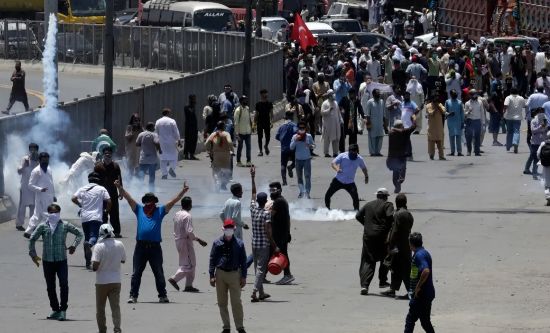
Pakistan’s ruling class marked a new period of political upheaval on 10 April 2022 when Parliament voted to remove Prime Minister Imran Khan from office. The decisive blow came a month earlier on 10 March, when military chief General Qamar Javed Bajwa refused to back Khan. Since Britain drew up its former colony’s borders 75 years ago, Pakistan has gone through 23 elected Prime Ministers in between three long periods of direct military rule. Not one has completed a constitutional five-year term: all were removed by assassination, corruption charges, military coups or forced resignations.
The background to the current crisis was a trade deal struck during a visit by Khan to Moscow on 25 February 2022, just hours after Russia began its military operation in Ukraine. The deal agreed that Pakistan would import two million tons of wheat from Russia. Hours later, US financial regulators imposed fines amounting to $55bn on the National Bank of Pakistan, citing violations of anti-money laundering regulations by its US arm. Then, in a UN General Assembly Vote on 2 March, Pakistan was one of 35 countries to abstain from condemning ‘Russian aggression against Ukraine’. In response, the US threatened to add Pakistan to its official list of state sponsors of terror alongside heavily-sanctioned Cuba, Iran, North Korea and Syria. Ignoring this warning, on 16 March Pakistan announced another deal with Russia, welcoming a $2bn investment by Russian construction companies to build the ‘Pakistan Stream’ north-south gas pipeline. Pakistan already has a similar, much larger, deal in place with China, which includes $62bn for port expansion, road and rail links, and new power plants.
Behind the scenes, Khan alleges, the US worked to engineer his removal. Two days before the parliamentary vote, Khan claimed possession of a diplomatic cable proving that a US official threatened intervention in Pakistan unless Khan were removed from power – either outcome, of course, paving the way to strengthen US domination of the country. The Pakistani high court blocked the public dissemination of this document, and Khan’s claims are denied by the Pakistani military and the US. The courts had already disallowed as unconstitutional Khan’s 3 April attempt to pre-empt the vote by calling a snap election. On 11 April, the majority coalition of opposition parties which ousted Khan selected former minister Shebaz Sharif for the top job. A general election is not constitutionally required until August 2023, though Sharif may call one sooner as his party controls just 82 of the 342 seats in the assembly. The US welcomed these developments and immediately approved of Sharif’s accession. The Sharif family is one of a handful of very wealthy families in Pakistan that have controlled a majority of the country’s industrial assets for decades and hold influential positions in the legislature. A 2013 study estimated that 45% of all current political office holders were related to previous ones.
Khan is distinguished by his ‘independent foreign policy’ – vocally criticising the US for its invasion of Afghanistan, its attacks on Iran and its support for Israel. He also positioned himself as an anti-corruption outsider candidate – with some legitimacy, as he does not descend from a political dynasty such as the Sharifs or the Bhuttos though he certainly comes from privilege. His shock victory in the 2018 general election was assisted by damning corruption allegations against the incumbent Nawaz Sharif and waning US influence in the region during the Trump years. From 2002 to 2018 the US supplied over $14bn worth of military aid to the country’s armed forces. As part of its ‘War on Terror’, US forces bombed Pakistan 430 times, leading to the deaths of over 5,000 people. Many of these attacks were launched from Pakistani military bases and a CIA drone base, which shut down in 2011. In office, Khan continued to allow US troops ground and air access, but refused to budge in the face of overtures to re-establish a US military base in Pakistan.
US allies quickly retaliated against Khan’s premiership. In 2018, the Financial Action Task Force, a G7 initiative, added Pakistan to its sanctions list for money laundering and terrorist financing. The Pakistani Foreign Minister claimed this would result in $10bn in annual losses to the economy. In 2019 the US unilaterally imposed visa sanctions on Pakistan for refusing to accept deported Pakistani nationals from the US. The same year, Khan negotiated a $6bn bailout from the US-backed International Monetary Fund (IMF). This added to Pakistan’s already high external debt, which has surged from $60bn to $100bn over the past eight years to prop up modest GDP growth. In exchange for loan instalments, the IMF demanded the privatisation of state-owned companies and the introduction of austerity measures. This put paid to the fuel subsidies and sales tax concessions which were supposed to be the beginnings of Khan’s ‘Islamic welfare state’. Shortly after the bailout, The Times reported that General Bajwa was directly meeting with key industry leaders, urging them to ramp up investment in exchange for dropping corruption investigations hanging over them (The Times, 21 October 2019). The worsening of these debts and unequal trade deals, combined with the recent surge in global energy and food prices, caused inflation to skyrocket. Pakistan’s poorest are now struggling with one of the worst cost-of-living crises in Asia.
Opposition leaders took advantage of popular discontent to remove Khan, but he has subsequently mobilised massive rallies of his supporters in major cities. He calls for immediate fresh elections. Voting reforms introduced by his administration open up the ballot box to Pakistani emigrants. Khan counts on political support from these expatriates who already support relatives back home via remittances but are mostly removed from active struggle. Sharif looks set to continue allowing foreign powers to plunder the country’s wealth, promising to make Pakistan a ‘paradise’ for investors at the expense of the poor.
Adam Grey




